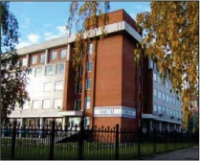"Problems of nature management, water resources state and environment conservancy under present-day interaction between nature and society" is the basic scientific trend of the Institute research approved by the Presidium of Siberian Branch of the Russian Academy of Sciences.
The Institute is involved in basic research within the following prior trends established by the Joint Academic Board on the Earth Sciences of the Siberian Branch of RAS:
- Natural processes in hydrosphere, atmosphere, cryosphere, the Earth surface and their evolution with due regard for anthropogenic impact;
- Ecology and rational nature management. The environment monitoring. Decrease of risk and aftereffects of natural and industrial catastrophies.
THE STRUCTURE OF INSTITUTE
Subdivisions in Barnaul city
- Laboratory of biogeochemistry
- Laboratory of aquatic ecology
- Laboratory of hydrology and geoinformatics
- Laboratory for ecological-geographical mapping
- Laboratory of regional nature management
- Laboratory of atmosphere ecology
- Chemical-analytical center
Novosibirsk branch of IWEP SB RAS
- Laboratory of hydrophysical and ecological processes modeling
- Center for water bodies field research
Gorno-Altaisk branch of IWEP SB RAS
Kemerovo laboratory of geoecological and water problems
The Institute owns 2 research stations:
the Kyzyl-Ozek soil-biological station in Republic of Altai
the Nizhne-Obsky hydrological-hydrochemical and hydrobiological station in Karym-Kary, Tyumen oblast
The establishment of Chemal station for complex investigations of mountain territories (Republic of Altai) is planned.
APPLIED RESEARCH
Institute for Water and Environmental Problems carries out research activities on nature conservation and environment protection on the assignment given by organizations and government bodies. The most significant ones were the studies performed in 1987-1993 on complex ecological examination of the aftereffects of two large hydroengineering projects realization, namely the Katun hydroelectric station (Katun river, Republic of Altai) and Krapivinsky hydrosystem Tom river, Kemerovo region).
In 1992-93 the Institute took part in Government program on the study of the influence of aftereffects of the past nuclear tests on Semipalatinsk Testing Site as well as of anthropogenic environment pollution on human health in Altai Krai.
Since 1987 till nowadays the works on the assessment of influence of rocket-space actions on the environment have been conducted jointly with Rosaviakosmos and Moscow State University. The territories of Altai Krai, Republic of Altai, Khakassia and Kazakhstan are the objects under study.
Since 1998 the development of scientific bases for the assessment of anthropogenic impact on water bodies has been carried out.
At present the Institute carries out works on the development of geoinformation systems to be used by experts in nature management.
The series of medical-ecological and ecological-geographical maps reflecting the environment state in the region has been created. The map of special protected natural regions and objects of Altai Krai was made. Medical-ecological atlas of Altai Krai is prepared for publication.
In 2002-2003 the Concept of State Program on the use, restoration and conservation of water objects in the Upper Ob basin (2002-2010) and Regional subprograms on the development of hydroeconomic complex of Russia "Water of Russia – XXI century" (2003-2015) were developed together with the Upper-Ob basin Water Department.
The development of regional models of sustainable development of Siberian regions, complex programs of regional development takes the important place in the Institute's activity. In 2002-2003 the Institute acted as the major creator of the Federal target program "Ecology and natural resources" in Altai Krai and Republic of Altai.
Major kinds of applied research carried out by the Institute are licensed, the researchers have acquired patents and certificates.
INTERNATIONAL SCIENTIFIC COOPERATION
During 10 years of its existence the Institute has been establishing and maintaining the international relations. The researchers of the Institute take part in international scientific events and visit research centers abroad at regular intervals. Every year the Institute receives foreign scientists interested in joint studies. At present the relations with a number of Universities and research centers in Europe, North America, Asia and Australia are maintained. The Institute constantly participates in international programs on nature conservation.
The most vivid examples of international cooperation are the following:
- "Water Project" program of International Institute of Applied System Analysis (Austria);
- "Assessment of mercury distribution and its role in ecosystems" project of Scientific Committee on Problems of the Environment (SCOPE);
- Russian-Belgium field trips on complex limnological study of Lake Teletskoye;
- "Sediment transport and morphoevolution of coastal zone" (US NAVY Office of Naval Research)
- "Morphology and coastal protection" (USA),
- Mercury distribution in different species of fish in Shelda river and the North Sea" (Belgium),
- Mathematical modeling of flows and the processes of pollutant and sediment transport in natural water bodies (rivers)" (Poland)
- Joint (with Paul Scherrer Institute) glaciological and glaciochemical study of the glacier on the Belukha saddle (Altai) to assess the current and retrospective air pollution in the region;
- Russian-Dutch investigations of Lakes Chany and Kulundinskoye carried out within the framework of international project "Conservation of wetlands and species composition in the south of West Siberia"
- International project "Golden Water" within the framework of AAHA
- International project "Feasibility Study on the Establishment of a Transboundary Biospherte Teritory in the Altai Region (China, Kazakhstan, Mongolia, Russia)

